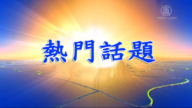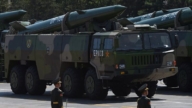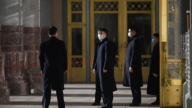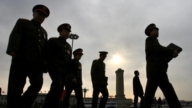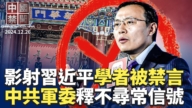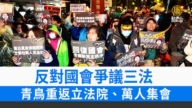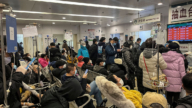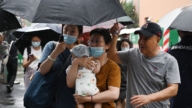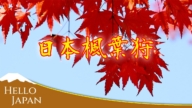【新唐人2012年5月11日讯】菲律宾与中国大陆针对南海黄岩岛的主权争议不断升级。大陆当局一方面对菲律宾进行严厉指责,一方面不断增兵恐吓。日前,中方又开始对从菲律宾进口的水果加强检验。这被外界解读为中方意图通过经济手段,迫使对方在南海问题上让步。下面请看本台记者的报导。
最近,大陆国家质检总局网站登出一则通知,说,各地检验机构多次从菲律宾进口水果中截获有害生物,要求各地检验检疫机构对菲律宾水果加强检验,加大开箱和抽查比例。
这一通知是5月2号发出的,8号在质检总局网站发布。这也是中国近期第二次要求加强检验从菲律宾进口的水果。
《美国之音》报导指出,这是大陆当局典型的用经济手段对政治施压的做法,日本和台湾也都曾经受到类似的经济胁迫。
菲律宾“香蕉种植与出口商协会”主席安蒂格对媒体表示,已经有一批出口到中国的香蕉没有能够通过中方检验。安蒂格认为,“黄岩岛对峙事件”导致中方实施更严格监管,菲律宾的庞大香蕉产业可能会因此受到重创。
据了解,中国是菲律宾目前最大的香蕉进口国。菲律宾每年出口7500万箱香蕉,其中一半以上卖给了中国。 2011年双边贸易额突破300亿美元,创下历史新高。
中国与菲律宾在南海黄岩岛海域因为主权问题而发生的对峙,已经持续1个多月。最近一个星期,黄岩岛附近的中国船只从14艘迅速增加到33艘。大陆外交部副部长傅莹也向菲律宾发出措辞严厉的警告,声称中方“做好了应对菲方扩大事态的各种准备”,大陆官方媒体则恐吓菲律宾“长此以往,终有一战”。
对此,时事评论员横河向《新唐人》分析指出,实际上,中共根本不关心所谓的领土主权,比如,通过对越南作战得到的领土,转眼就又送给越南。中共只是惯于利用外部事件来淡化国内的统治危机。
横河:“就是说,在国内政局不好的情况下,对中共的统治很不利的情况下,或者是危机的情况下,那它确实需要用一些东西,一方面来转移注意力,另一方面,它一打仗就可以以某种紧急状态,使得国内的一些活跃人士就不能再说话。”
横河表示,当年邓小平下令对越南开战,就是要通过战争来巩固地位和政权。而现在与中越战争不同的是,中国并不善于海军作战,一旦开战必须速战速决,因此大陆当局很难做出决定。
横河:“因为只要战事一拖,对它的统治马上造成巨大威胁。因为它本来是想用这个民族主义来掩盖它的统治危机的,但是战争一旦打起来,不能够速战速决,不能够取得一个能够交代的胜利的话,那就会加速它的危机。”
“英国广播公司”《BBC》报导,菲律宾国防部长盖兹敏9号表示,在华盛顿会谈中,他获得保证:如果南海爆发冲突,美国将根据1951年签署的《美菲共同防御条约》保护菲律宾。
原纽约州立大学教授谢选骏:“如果中国跟菲律宾发生武装冲突的话,那就意味着它会和南海其他国家发生类似的冲突,最后会把美国卷进来。如果把美国卷入争端的话,它就会遇到很大麻烦了。美国就会和南海其他国家联合起来,形成一个军事同盟。”
谢选骏认为,当局很可能只是假装要发生武装冲突,以此来压制国内持不同政见的人士。但实际上,中共不敢对外动武。
采访/常春 编辑/李谦 后制/孙宁
************************
South China Sea Confrontation Continues, Chinese Regime applies Economic Pressure
The dispute between the Philippines and mainland China
over the sovereignty of Huangyan Island continues to escalate.
The mainland regime continues to criticize the Philippines and
is increasing military build-up in the area.
Recently, the regime also started to apply strict inspection of
fruits imported from the Philippines.
Many suggest that the Chinese regime is trying
to force Philippines to back away through economic pressure.
Recently, mainland China’s state Administration of Quality
Supervision posted a notice to its website,
saying that they had detected harmful substances in fruits
imported from the Philippines and requested that
local Quality Supervision agencies strengthen inspection of
fruits from the Philippines.
The notice was announced on May 2,
and posted to the website on May 8.
This is the second time that China has requested strengthening
the inspection of fruits from the Philippines in the recent period.
Voice of America reported that this is a typical method that
the mainland regime uses to apply economic and political pressure,
Japan and Taiwan have also suffered
such economic threats in the past.
The Chairman of the Philippine’s Banana-Growers and
Exporters Association Stephen Antig told media,
some bananas exported to China have already failed inspection.
Antig believes, the Huangyan Island incident caused the Chinese to strengthen inspection.
This might cause a major blow to the giant banana industry in
the Philippines.
According to sources, China is the largest importer of
bananas from the Philippines.
The Philippines export more than 75 million crates of bananas,
more than half is sold to China.
In 2011, the total bilateral trade between the two countries
exceeded 30 billion U.S dollars, the highest point yet reached in history.
The China-Philippines confrontation has persisted
for more than one month.
In the past week, Chinese shipping near Huangyan island
has increased from 14 to 33 ships.
The Chinese regime’s Deputy Foreign Minister Fu Ying
has already warned the Philippines that,
China is “prepared for any Philippines attempt
to expand the issue.”
Mainland Chinese media threatened that,
“if the situation continues, it will eventually lead to war.”
Regarding this, social commentator Henghe told NTD that,
in reality, the Chinese Communist Party (CCP) does not care about sovereignty disputes,
they will take the island from Philippines and
give it to Vietnam right away.
The CCP is trying to use foreign conflicts to cover up
it’s own internal crisis.
Henghe, “That is to say, when the situation in China is bad,
very unfavorable for the CCP rule, or during a crisis,
the CCP needs something to divert attention.
On the other hand, fighting a war will cause an emergency
situation, which will force some active people in China to stop talking.”
Henghe expressed, back when Deng Xiaoping ordered war with
Vietnam, it was to consolidate his status and ruling authority.
The only issue is, the CCP is not good at naval war,
so if war needs to be fought quickly, then the regime will face some hard decisions.
Henghe, “If the war drags on,
then it will cause a major threat to CCP rule.
It wishes to use this patriotic action to cover up
the political crisis,
but if the war starts and doesn’t end quickly, or it can’t
get a definitive win, then that will accelerate the crisis.”
British media BBC reported, while meeting in Washington
on May 9, Philippine Defense Secretary Gazmin received support from the U.S.
If war breaks out in the South China Sea, the U.S will protect
Philippines according to the US-Philippine Mutual Defense Treaty of 1951.
Former New York State University Professor Xie Xuanjun
expressed, “If China starts an armed conflict with Philippines,
then it means it will have similar conflicts with other South China Sea nations, eventually dragging the U.S into this conflict.
If the U.S gets involved, it (CCP) will face major issues.
The U.S will form a military alliance with other South China Sea nations.”
Xie Xuanjun also believes, the Chinese regime is trying
to use the armed conflict to silence dissidents within the country.
In reality, the CCP will not dare to go to war.


